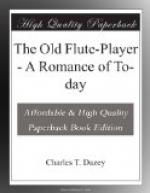John was out of town much of the time and when he came it was impossible for him to see much of the little German maiden, and this made Anna most unhappy. Deep in her heart she knew that what her father had described had come to her—she knew she loved; but it was all a mighty puzzle. Even if he loved her in return, of which she was by no means certain, he was not at all the sort of man, she thought, of whom her father would approve. Her father’s notions were the notions of the stiff old world. He had said that she must wait until he was a flute-player no longer and that when that glad time came, he would, himself, pick out for her the handsomest and bravest gentleman whom he could find and bring him to her, ready-made, to love. She knew he felt a great contempt for riches; she knew that his experience of America had far from prepossessed him in favor either of the country or the people in it. She was absolutely certain that the man whom he would choose for her would be a very different sort of person from John Vanderlyn. Handsome he was, for certain, strong he was, for sure; but he was not a German and she knew that when her father spoke of “gentlemen” he had in mind none but a well-bred, well-born German.
It seemed to her, as she reflected on this matter, that she could not possibly endure to wed a German. She was, indeed, a little frightened by what her father had declaimed about her future and the matter of her courtship.
Then things happened, all at once, so suddenly that she could scarcely credit her own knowledge of them. One morning, coming in with Mrs. Vanderlyn from a long ride, she was informed that Herr Kreutzer had just been there with M’riar, and had left a note for her upon her dressing-table after having waited for a time. The note said that he had an unexpected holiday and begged her to come home, if possible, to spend it with him, and she was just coming out of Mrs. Vanderlyn’s boudoir, where she had gone to get permission, when she unexpectedly met John. He had come home without notice and ahead of time from one of his long journeys.
CHAPTER VI
“Has she not come then, yet, my child?” said Kreutzer to the busy M’riar, as he returned. He had thought that Anna might have reached the tenement by that time, for he had gone out a second time and made a number of delightful, although meagre purchases.
“No signs,” said M’riar. “Yn’t see a sign of ’er. But hit cawn’t be long before she’ll be ’ere, can it?”
“No, M’riar; not long.”
The place was poorly furnished. Marks of poverty, indeed, were everywhere; but upon the little table with its oil-cloth cover, soon began to show, as he brought package after package from his pockets, an array of goodies which amazed M’riar greatly. From the little gas-pipe chandelier which hung above the table (fly-specked and badly rusted before M’riar’s busy hands had done their best to polish it, and still uncouth in its plain iron and sharp angles), he hung a little wreath of evergreen. Out of a package, with the utmost care, he produced a frosted cake.




